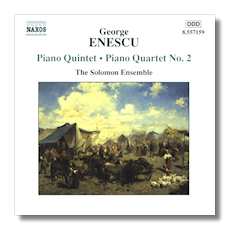
The Internet's Premier Classical Music Source
Related Links
- Enescu Reviews
- Latest Reviews
- More Reviews
-
By Composer
-
Collections
DVD & Blu-ray
Books
Concert Reviews
Articles/Interviews
Software
Audio
Search Amazon
Recommended Links
Site News
 CD Review
CD Review
George Enescu

Chamber Music for Piano & Strings
- Piano Quintet, Op. 29 (1940)
- Piano Quartet #2, Op. 30 (1943/44)
The Solomon Ensemble
(Anne Solomon; Andrew Roberts; Ralf Ehlers;
Rebecca Gilliver & Dominic Saunders)
Naxos 8.557159 63 mins
George Enescu (1881-1955) was a great musical polymath, less famed as a composer than he wished. In my youth I was familiar with him on '78s, as violinist partner to his pupil, the boy Menuhin, in the still evergreen recording of the Bach double concerto; later, in 1952/53, as a conductor of sensitivity and authority, despite being bent nearly double with a spine affiction which restricted his movements.
In his liner notes, Richard Whitehouse writes about these subtle chamber works, their 'density of thought and subtlety of expression not easy to grasp fully at first hearing, but intriguing enough to repay repeated listening'. Each is in three expansive movements totalling around half an hour. The quintet's first movement 'sustains concentration over a lengthy time-span – with subtle contrasts in mood and pacing'. There is a darker, noble andante sostenuto e cantabile, after which 'the succeeding Vivace ma non troppo is more animated – alternating a robust, dance-like main theme with episodes of a more inward nature'. Each of the three movements of the 2nd piano quartet 'adapts respectively sonata, ternary and rondo forms in unexpected ways, so that the transformation of themes is pursued continuously – typical 'late' Enescu: witness the many instances where the composer draws the strings into a translucent continuum of sound, their combined timbre complemented, rather than opposed, by piano writing in which Romanian folk inflections are distilled to a rarefied degree.'
The Solomon Ensemble was founded by two musicians who had worked on Enescu's music with Menuhin, violinist Anne Solomon - herself a polymath in the Enescu mould, with degrees in Philosophy and Medicine - & pianist Dominic Saunders.
The Naxos website is so well organised that for cyber readers more detailed introductory descriptions in reviews are redundant. Navigating to Composers/Enescu will take you straight to this interesting CD, with tracks to hear and Richard Whitehouse's comprehensive essay to read.
The repertoire of piano quartets and quintets is not a huge one, so good ones should not be jettisoned. The music is well played and equally well recorded. The disc is clearly the culmination of long labours of love, and Naxos should take justifiable pride in having supported it. What more can you expect for (very nearly) £5?
Copyright © 2003, Peter Grahame Woolf


















